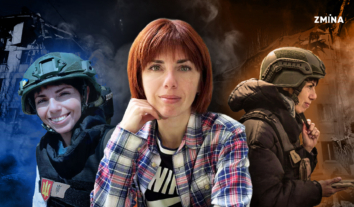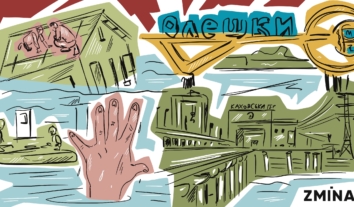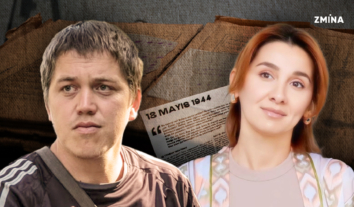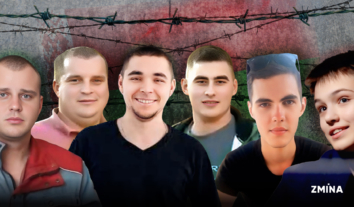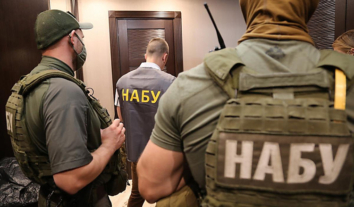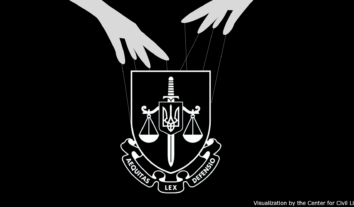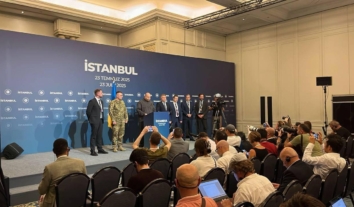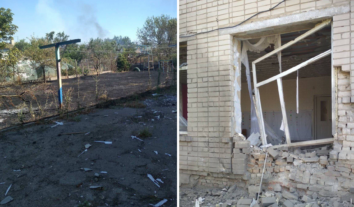A story of an elderly man from Balakliya on a 12-day hunger strike in Russian captivity
Russian occupying forces took 73-year-old Viktor Illinsky from his home in Balakliya, Kharkiv region, in early August 2022. They wrapped a jacket around his head, put him in a military jeep, and drove him to the local police station.
He was held with other civilian hostages, including another man in his 70s, in a cramped cell. From time to time, the Russians took the detainees for interrogation and tortured them. Older people were also tortured.
From the first day of his imprisonment, Viktor started a hunger strike. He tried to provoke a critical health condition to escape captivity and avoid the Russians’ abuse.
The man told ZMINA’s team during a field mission to the reoccupied territories in the Kharkiv region about his illegal arrest, the conditions of detention at the police station, interrogation, and a “lucky” incident.
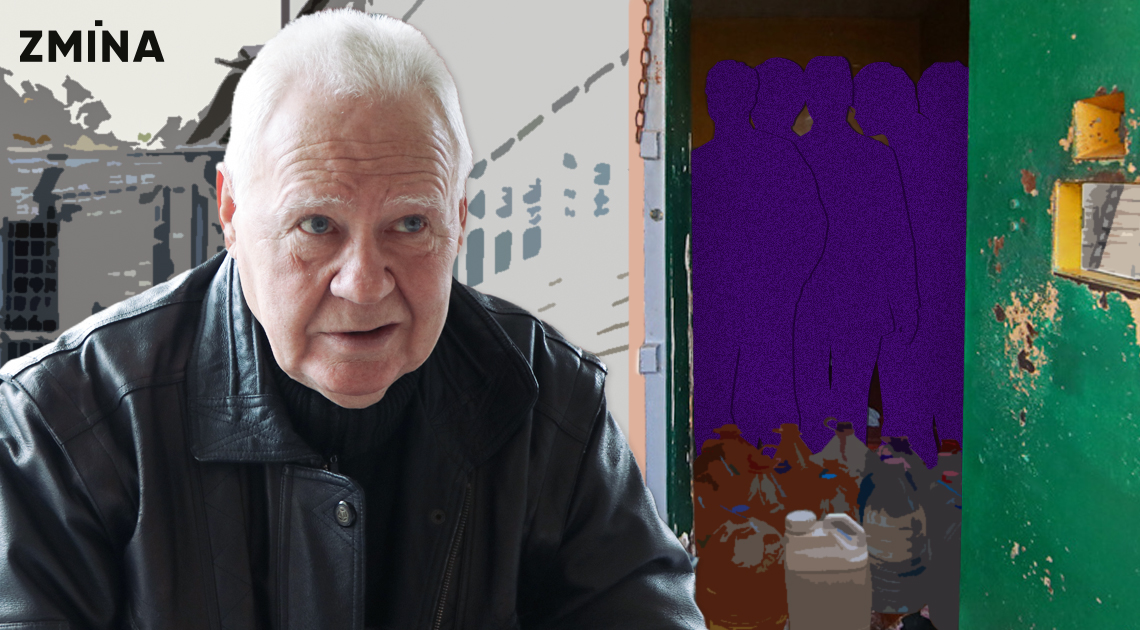 A collage of ZMINA with a photo of Viktor Illinsky
A collage of ZMINA with a photo of Viktor Illinsky“Your fate is being decided now.”
After the occupation of Balakliya, Viktor Illinsky stayed in the city, in particular, to help his former mother-in-law, who is 82 years old. The small town in Izium rayon on the northeast side of the Siverskyi Donets River was captured by Russian forces on March 3, 2022, and remained occupied for six months.
After another trip to see his mother in early August, the man returned home at 8:30 a.m. Half an hour later, Russia’s Federal Security Services (FSS) officers arrived at his house.
“Three men with machine guns came to me. They asked for documents and checked my passport and phone. I had my computer on, and they started searching through it,” Illinsky recalls.
The Russian military also checked everything in the house. During the search, they constantly threatened the man and tried to provoke him to aggression.
“They told me to get dressed. I was wearing a T-shirt and sweatpants. So I told them I was already dressed. I didn’t know what the clothes were for,” the man says.
Then, one of the soldiers took a summer leather jacket off a hanger and tied it on Illinsky’s head. The man was put in a military vehicle and taken to the district police station.
Russian military and special services detained and tortured townspeople and residents of neighboring settlements on that premise, according to multiple reports documented by Ukrainian human rights defenders.
At the district police station, the Russian occupying forces took Illinsky’s documents and put him in a cell, and after 40 minutes, the window in the door opened.
“Now your fate is being decided. Give us the passwords to your computer,” the military told the new prisoner.
The man handed over everything the Russians asked for, and that was the end of their communication for the next four days.
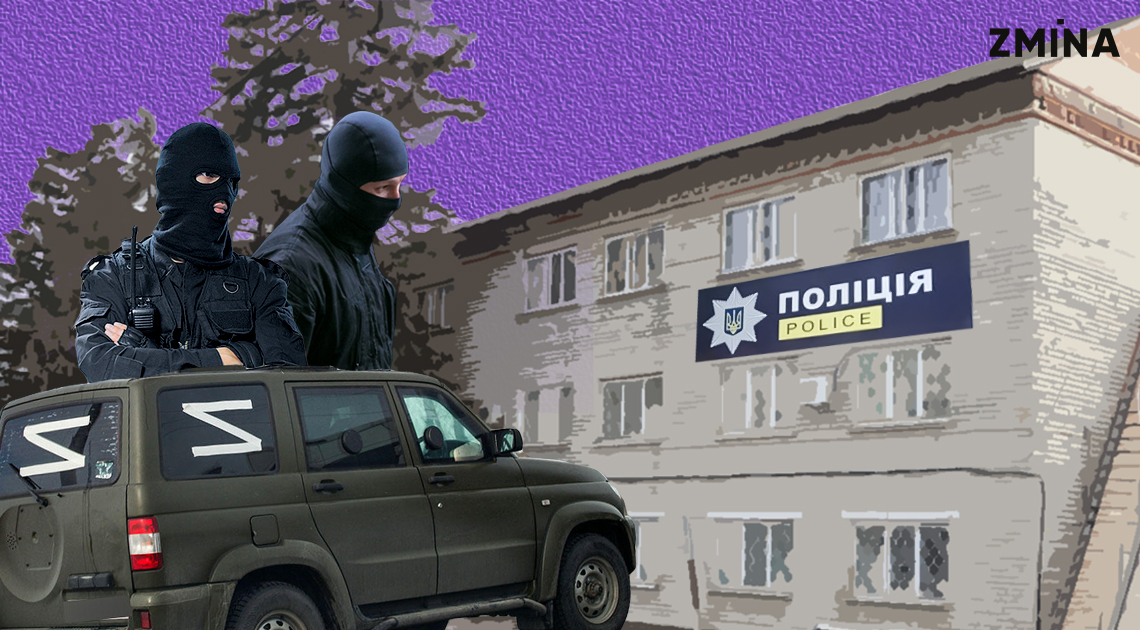 A collage of ZMINA based on the story of Viktor Illinsky
A collage of ZMINA based on the story of Viktor IllinskyThe cell where Illinsky was placed was designed for three people, but 7-8 prisoners were regularly held there.
“For one day or half a day, there were four of us in the cell – it was a blessing,” the man says ironically.
He also recalls that the room often became suffocating, especially when the Russians deliberately turned off the ventilation.
The cell had a toilet and a sink, but the water supply was intermittent. The prisoners stocked up on bottles and canisters of water, which was still insufficient to maintain proper hygiene.
Another older adult, 70-year-old video blogger Anatoliy Garagaty, was held in the same cell for a long time. Since there were only three bunks, other detainees often offered older people to occupy them so they would not sleep on the concrete floor. In fact, the bunks were occupied mainly by those the Russians had severely tortured during interrogations.
“Most of all, they mocked people not from Balakliya,” Illinsky notes.
For instance, he told about a man from the Luhansk region held in their cell. He came to the occupied territory to find his wife, who had gone to her family.
“His ear was shot through. After the interrogation, he was so beaten that he had to be taken to the cell,” Viktor Ilyinsky recalls.
Victor himself was first summoned for interrogation on the fourth day of detention. The man was removed from the cell with a bag over his head and did not remove it even when the interrogation began.
“The interrogation lasted four minutes. They put me on a chair, and I said my name and surname. Then suddenly there was a loud explosion, the ceiling shook, and they all ran away,” says Illinsky.
As the man found out later, it was an artillery shelling. He was immediately taken back to his cell.
“I was lucky,” he adds.
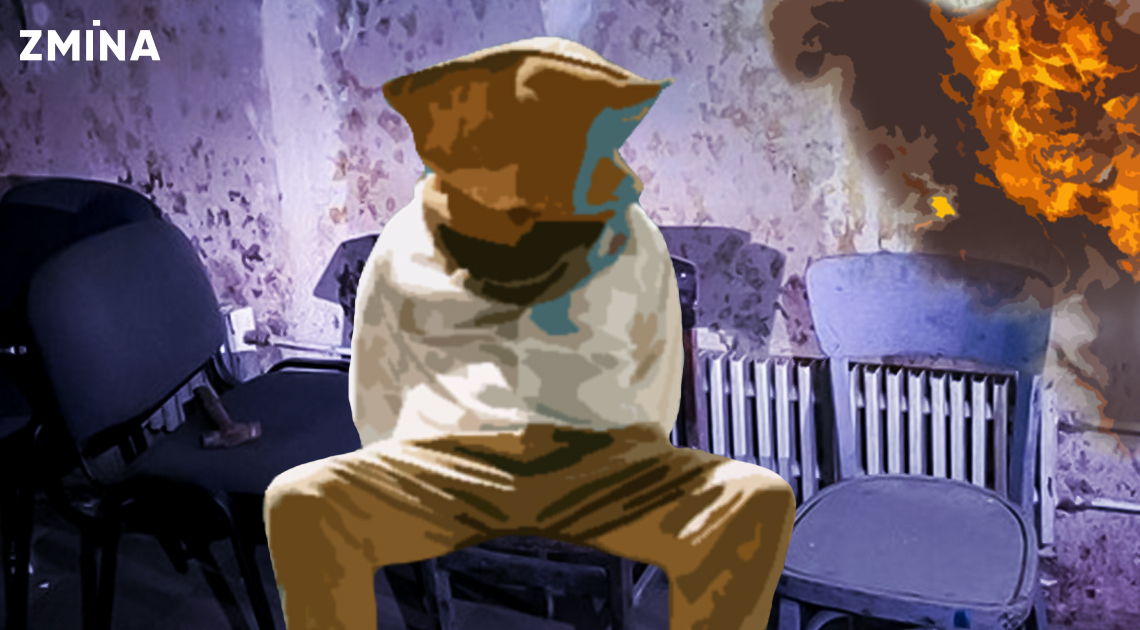 A collage of ZMINA based on the story of Viktor Illinsky
A collage of ZMINA based on the story of Viktor IllinskyRescue plan
At first, the most challenging thing after the detention was that the man’s family and friends did not know he had been taken away, says Illinsky.
“We have many people who disappeared like that. No one saw how people were taken away, and then the Russians told us not to look for them because they were already dead,” the man adds.
From the first day of his detention, Illinsky decided to go on a hunger strike. According to his estimates, he would have lost consciousness on the 16th to 18th day.
“In that case, they would have had to hospitalize me. That was the only thing I had,” the elderly man says.
The man hoped that the Russian occupying forces would not want to bring the situation to such a point because the locals would find out about it.
Vicktor adds that many people in the city know him, and some even consider him wealthy. This may be why he was detained, the former prisoner says. However, the Russians never gave him an official reason.
Despite the hunger strike, the military did not return to the man for more than a week.
“It was tough for me, unbearable,” Illinsky recalls those days.
It was hot in the cell during the day and cold and drafty at night.
“It was hard all night, just waiting for the light to come on. It was impossible to sleep.”
Due to the constant lying on the concrete floor, the man developed injuries, especially on his sides.
On the 12th day of his detention, the guards came to pick him up. Again, he was taken to the interrogation room with a bag over his head.
The Russians offered Illinsky to collaborate. The man was indignant.
He emphasized that he still did not know the reason for his detention.
“You write everywhere that you do not arrest people over 60. If you are afraid of people like me, who are 73 years old, what kind of army are you?”
Then, the man heard a click, similar to a stun gun sound. One of the soldiers asked him if he wanted to go home. Illinsky said yes.
After that, something was put on the man’s lap. He touched it and realized it was his bag with documents. The Russians ordered him to check everything, but they did not take the load off his head – the man tried to see his belongings through a thin gap under the fabric.
Without removing the bag, the man was lifted and taken out of the police station.
“The 12 days of hunger strike, of course, affected me. I was standing on the street and suddenly felt shaky. I sat down on the grass for 5 minutes and only went home,” Illinsky recalls.
At home, the man saw his belongings scattered in his house after the search, and his car was open. Neighbors later told how the Russians meticulously searched through his vehicle.
“That was the end of my story,” Illinsky says.
On the next day, he returned to the police station with packages for his cellmates from yesterday.

